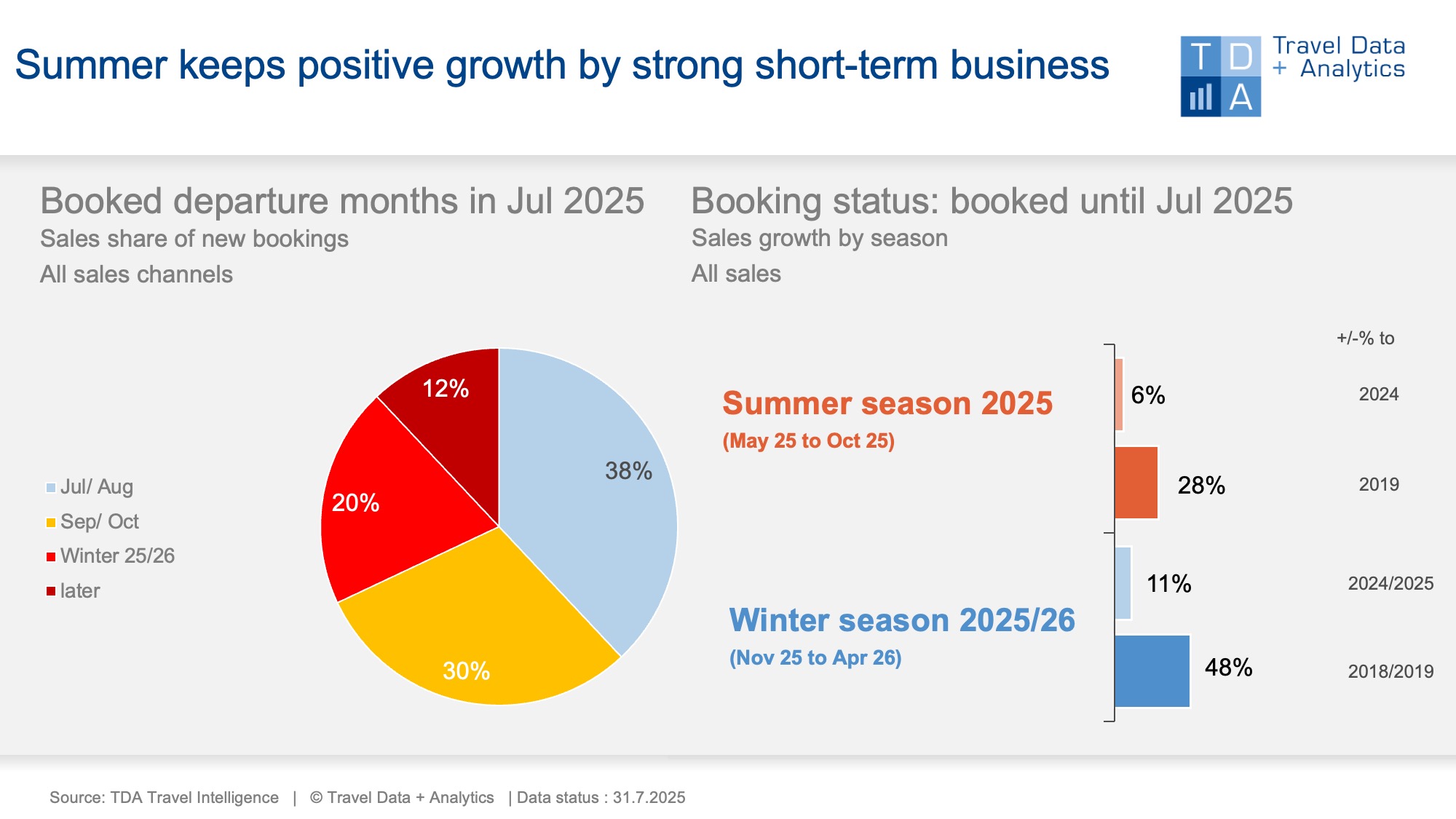Nuremberg, August 28, 2025 – Last-minute business for package holidays and modular vacation packages picked up noticeably in July. Nevertheless, the bottom line is only slight growth, as last-minute sales were already strong in the same month last year due to the FTI collapse. With a 1 percent increase in sales in July, the current 2025 summer season is able to maintain the previous month's cumulative growth of 6 percent. The upcoming 2025/26 winter season is down two percentage points on the previous month and currently shows cumulative sales growth of 11 percent. Early bird sales for next year's summer season are rising at a remarkably strong rate.
Of the total monthly turnover in July 2025, 13 percent is attributable to last-minute bookings for holidays departing in July and a further 25 percent to departures in August. The rainy July across Germany is likely to have had a positive impact on last-minute business this year. With just under a third of bookings for fall vacations, a total of 68 percent of monthly sales are attributable to the current summer season – three percentage points less than in the same month last year, when many vacationers made replacement bookings for their canceled FTI trips. The FTI effect last summer virtually rules out any major growth spurts in this year's summer months. Nevertheless, this year's summer season is looking relatively good: sales are still up 6 percent on the previous year, which means that – measured against total sales for last year's 2024 summer season – occupancy is currently at 87 percent (previous month: 84 percent). The number of holidaymakers booked is roughly the same as last year (+1 percent).
Bookings for winter holidays for the upcoming 2025/26 season account for one-fifth of monthly sales in July. Winter bookings are only 2 percent higher than last year's figures for the same month, which is not enough to maintain the cumulative increase. Compared to the previous month, the balance is down by two percentage points. Based on the current booking status, the 2025/26 winter season shows an 11 percent increase in revenue compared to the previous year. The number of winter vacationers booked exceeds the previous year's level by 7 percent. Long-haul travel remains in above-average demand (passengers: +11 percent). The highest growth in demand among the most booked winter destinations is currently being recorded in the United Arab Emirates and Cape Verde. Proportionally, around one in five winter vacationers who have already booked a trip are going on a long-haul trip, and almost as many have booked a cruise to date. Among the most popular winter destinations at country level, the Canary Islands remain the (eternal) number one (share of passengers around 19 percent), followed by Egypt in second place in the ranking. Although Greece is not one of the top destinations in winter, the extension of the season is clearly reflected in the figures with strong growth. Turkey, on the other hand, ranks fifth in the ranking of the most booked winter destinations, but cannot maintain the strong growth of the previous year (passengers: -9 percent, revenue: -3 percent).
In July, early bookings for next year's summer season increased significantly, accounting for 12 percent of sales in the past booking month. This represents a remarkable increase of five percentage points compared to the same month last year.

Legend:
The chart shows the cumulative holiday bookings generated by the end of July 2025 for the next winter season 2025/2026 and the current summer season 2025 compared to the previous year. TDA's analysis includes holiday travel bookings in travel agencies as well as online on the travel portals of tour operators and online travel agencies (OTAs) with a focus on package holidays. The chart on the left shows the percentage of sales in the booking month of June accounted for by the individual travel months and seasons.
About TDA Travel Intelligence
Travel Data + Analytics (TDA) took over in spring 2019 the travel sales panel run by the Nuremberg market research company GfK since 2004. After the GfK data had been migrated to a new IT landscape, Travel Intelligence was set up as an independent solution with a self-learning database and associated analysis tool. The basis remains the booking data from stationary travel agencies and online portals that sell tour operator products. The requirements of tourism companies on a modern control instrument and evolving, increasingly dynamic questions can thus be mapped reliably and promptly, without giving up the core of a market-representative method that is consistently comparable over time. TDA = Current booking situation + individual product performance + new market opportunities.
Further information: Alexandra Weigand, alexandra.weigand@traveldataanalytics.de, phone: +49 (0)911 951 510 03